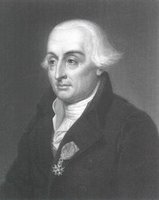Joseph-Louis Lagrange
From The Encyclopedia of Earth

Joseph-Louis Lagrange. (Source: Space Telescope Science Institute)
Lagrange, Joseph-Louis
April 18, 2007, 12:39 am
| Topics: |
This content is not assigned to a topic
|
Joseph-Louis Lagrange (1736-1813), a French mathematician and mathematical physicist who developed the calculus of variations. Widely regarded as the greatest mathematician of the eighteenth century, his work Mècanique Analytique (Analytical Mechanics, published in 1788) is considered a mathematical masterpiece that covered nearly every area of pure mathematics without the use of a single diagram. Lagrange established the theory of differential equations, invented the method of solving differential equations known as variation of parameters, and provided many new solutions and theorems in number theory. Lagrange succeeded Leonhard Euler as the Director of the prestigious Berlin Academy.
Further Reading
- Analytical mechanics - Lagrange's equation and its application (PDF), University of Missouri-Rolla.
- Joseph Louis Lagrange (1736-1813), University of Dublin, School of Mathematics.
- Joseph Louis Lagrange biography, University of St. Andrews, Scotland, School of Mathematics and Statistics.